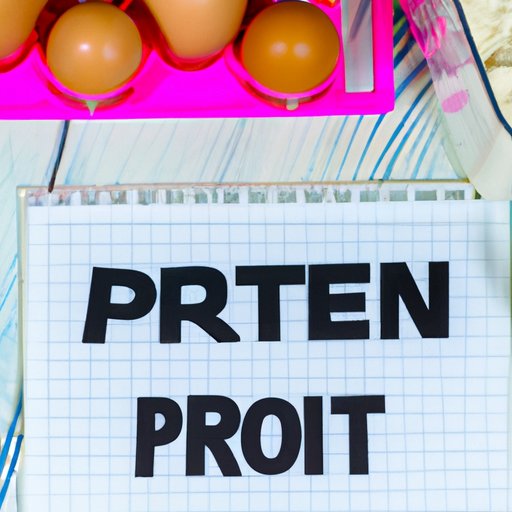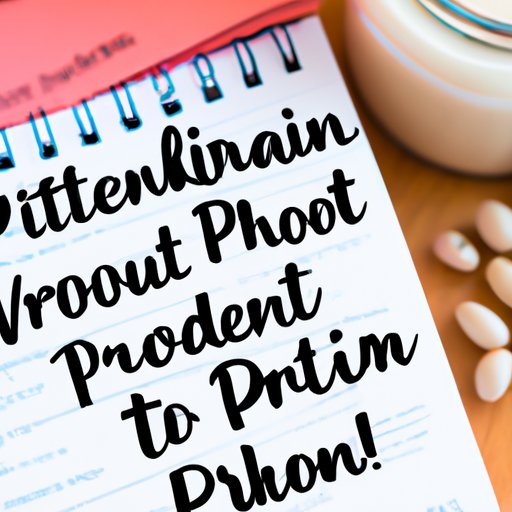
I. Introduction
Losing weight can be a challenge, and finding the right tools to help can be even harder. In this article, we will explore the role of protein in weight loss. From the science behind how it works to tips for success, we will cover it all. In the end, we hope to provide readers with a comprehensive guide to using protein as a helpful tool in their weight loss journey.
II. The Role of Protein in Weight Loss: How It Works and Tips for Success
Protein is an essential nutrient that fuels our bodies. When it comes to weight loss, protein can be a secret weapon. Eating protein helps to keep you feeling full for longer, reducing the likelihood of overeating. This is because protein takes longer to digest than carbohydrates, making it a great meal choice for those trying to reduce their caloric intake. Additionally, protein is critical for maintaining and building muscle mass, which is important for increasing your metabolism. Tips for incorporating more protein into your diet include starting your day with a protein-rich breakfast, incorporating lean meats into your meals, and incorporating more plant-based protein sources like beans and lentils.
III. Why Adding More Protein to Your Diet Can Help You Lose Weight
The science behind how protein aids in weight loss is well-documented. Eating protein causes a rise in the levels of satiety hormones in the body, which reduces feelings of hunger. Additionally, protein has a high thermic effect, meaning that it requires more calories to digest than carbohydrates or fats, further contributing to a caloric deficit. Protein also plays a role in boosting metabolism, which can be a key factor in weight loss. Examples of protein-rich foods include chicken, turkey, fish, tofu, yogurt, and nuts.
IV. Protein-Packed Meals for Lasting Weight Loss
Eating protein-rich meals can help you stay full for longer, reducing the likelihood of snacking on unhealthy foods. Protein-rich meals also help to maintain muscle mass, which boosts metabolism. Examples of healthy and satisfying protein-rich meals include baked chicken with vegetables, a tofu stir-fry with brown rice, and grilled fish with a side salad.

V. Maximizing the Benefits of Protein: How to Incorporate It Into Your Weight Loss Journey
Incorporating protein into your diet can be challenging, especially if you’re used to eating a high-carbohydrate diet. One tip for making the transition easier is to start slowly and make small changes over time. Incorporating protein into snacks, like a Greek yogurt with berries or a serving of nuts, can also be an effective way to boost protein intake. Strategies for including protein in meals include adding protein powder to smoothies or replacing pasta with zucchini noodles.
VI. The Power of Protein: A Comprehensive Guide to Losing Weight Through Diet
A protein-rich diet can be a powerful tool for weight loss, but it’s not always easy to implement. Many people struggle with incorporating more protein into their diets due to taste preferences or unfamiliarity with protein-rich foods. However, those who do make the switch to a protein-rich diet often see great results. Success stories include those who have lost weight and improved their overall health by switching to a high-protein diet.
VII. Protein and Weight Loss: The Science Behind This Winning Combination
The science behind protein and its impact on weight loss is extensive. Research studies have found that protein can help to reduce appetite, increase metabolism, and reduce body weight. A 2014 study published in the American Journal of Clinical Nutrition found that consuming a high-protein, low-carbohydrate diet improved weight loss and body composition. Another study published in the International Journal of Obesity found that increasing protein intake led to a greater reduction in body weight and waist circumference.
VIII. How Protein Can Help You Lose Weight Without Feeling Hungry
One of the reasons that protein is so effective for weight loss is due to its satiating effects. Eating protein makes you feel full, reducing the likelihood of overeating. Protein also helps to control hunger and reduce cravings. Eating protein with meals can help to stabilize blood sugar levels, which can prevent hunger pangs and cravings. Tips for incorporating protein into meals include choosing lean protein sources, such as chicken or turkey breast, and including protein-rich snacks like hard-boiled eggs or peanut butter on celery sticks.
IX. Conclusion
In conclusion, protein can be a powerful tool for weight loss. Incorporating more protein into your diet can help to reduce appetite, increase metabolism, and maintain muscle mass. Tips for success include starting your day with a protein-rich breakfast, incorporating lean meats into your meals, and choosing plant-based protein sources. Remember, small changes over time can lead to big results, so start slowly and build up your protein intake gradually.




